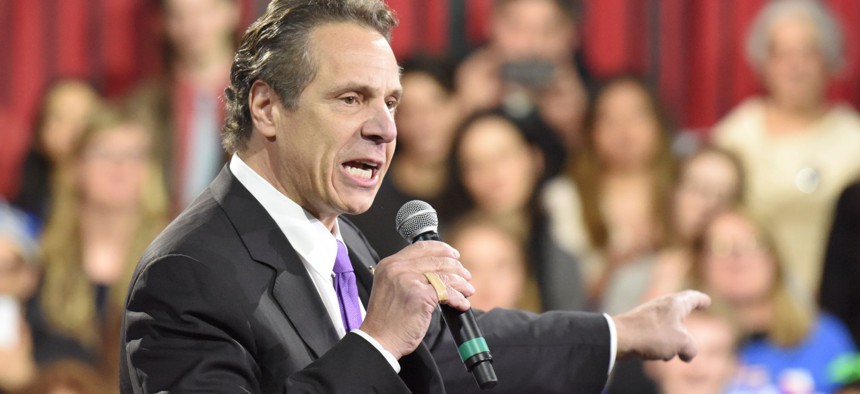Cuomo to Take Preemptive Action Protecting N.Y. Health Insurance Coverage From ACA Repeal

New York Gov. Andrew Cuomo Shutterstock
Also in our State and Local Weekend Digest: Affordable housing difficulties grow in Columbus; California's struggling recycling sector; and why Miami drivers don’t use turn signals.
Here’s some of what we were reading this weekend ...
HEALTH CARE | New York Gov. Andrew Cuomo plans to release emergency regulations on Monday that would create protections for health insurance coverage in the state should the federal Affordable Care Act be fully or partly repealed. Included in the measures are mandates that any company doing business in the state’s marketplace comply with the 10 “essential health benefits” as defined by the ACA, and directs the state’s health department to ban companies that withdraw from the marketplace from participating in Medicaid or the state’s children’s health plan. Earlier this year, Cuomo, a Democrat, took similar pre-emptive measures regarding a possible repeal of the ACA by requiring insurance companies doing business in New York state to continue offering birth control with no co-pay. [The New York Times; Gothamist]
Meanwhile ... in Maine and Wisconsin, led by Republican governors, are looking to be the first two states to experiment with Medicaid requirements under the Trump administration, with both requesting approval to charge monthly Medicaid premiums to people living in extreme poverty and impose work or volunteer requirements on some Medicaid enrollees. Around 265,000 Maine residents are enrolled in Medicaid ann an estimated 50,000 of them could be impacted, according to Maine Equal Justice Partners, an Augusta-based liberal advocacy group. [Portland Press Herald]
HOUSING | Columbus, Ohio, isn’t normally a place you’d immediate associate with the nation’s housing-affordability crisis, but continued redevelopment of central city neighborhoods, like the Short North, which are popular newcomers to the area, has been putting pressure on the stock of housing eligible for Section 8 vouchers. Of the 16 ZIP codes within the city’s pre-1950s boundaries—Columbus has annexed many adjacent suburban areas since then—seven have lost subsidized housing since 1994, according to the Columbus Metropolitan Housing Authority. At the same time, nearly all of the 35 remaining ZIP codes in Franklin County, which includes Columbus, saw their share of households using rental vouchers increase. [The Columbus Dispatch]
HOMELESSNESS | The police chief in Eureka, California, is looking for feedback on a proposal for a temporary day-use area for homeless people in the city, a possible solution that leaders hope “to find reasonable solutions that address violations of the municipal code and improve the overall business climate in the surrounding area.” An annual point-in-time homeless count found around 200 unsheltered people in Eureka. [The Times-Standard]
TRAFFIC SAFETY | If Oklahoma Gov. Mary Fallin approves a legislation that passed last week that would make it illegal for drunk-driving suspects to refuse a breathalyzer test, it would also eliminate an administrative appeals process used to challenge the revocation of a suspect’s driver’s license. The measure has support from Mothers Against Drunk Drivers. [The Oklahoman / NewsOK]
Although drivers in Miami are required to use turn signals while out on the roads, there is an epidemic The reasons for Miami-area drivers failing to use turn signals are complicated, according to automotive engineer Richard Ponziani, but there’s “a volatile mix” on the roads of South Florida, including “elderly drivers, tourists on vacation in an unfamiliar place driving in an unfamiliar rental car, and people who have moved there from other countries, where the rules and customs are different.” Then there’s machismo, according to Michael French, professor of health economics at the University of Miami. “Not letting someone in is more common behavior among males, and refusing to use the turn signal is an affirmation of manhood.” [The Miami Herald]
WASTE MANAGEMENT | In California, more than 800 recycling centers have closed in the past three years and the state’s empty beverage container recycling rate has fallen below 80 percent for the first time since 2008. Current economic conditions and commodities prices has made the recycling business tough, so CalRecycles, which oversee state and local recycling programs in the Golden State, is proposing changes that would restructure payments and processing fees. [The Sacramento Bee]
ECONOMIC DEVELOPMENT | More North Dakota residents who are out-of-work in the wake of the downturn in global energy prices are seeing signs of a rebound. “I don’t think it’s as robust as we’d like it to be. But it is definitely improving,” according to one energy consultant, based in Williston. But North Dakota’s shale oil sector is also seeing new competition from newer fields in New Mexico and Texas. [Star Tribune]





